As we celebrate Vesak, honoring the Buddha’s life and enlightenment, Brother Phap Huu reminds us to recognize the awakened nature in ourselves and one another, transform habit energies and reflect on the legacy we offer to the world through our thoughts, speech and actions.
Cherishing Life Daily
This week, many communities are coming together to celebrate the birth of the Buddha. In our tradition, when we celebrate the birth of the Buddha, we don’t just learn only about the historical Buddha, we learn to identify and to recognize the Buddha nature that is present in every single one of us. We also need to learn to cherish life. Life is a gift. Cherishing life daily is the art of meditation and the art of mindfulness.
Our teacher has a calligraphy that reads, “You are alive.” It is so simple, but there is a deep teaching in that. Because a lot of the time, we are alive, but we don’t know we are living. We are running towards the future with all of our projects, our ideas of success, our idea of happiness, and we say, “I’ll wait until I get those conditions, and then I will be more alive. I will be more happy and joyful”
We can have a tendency to live in the past. We live from the experiences we inherited, and we live with regret, sorrow, and the idea of “what if.” What if I could have done this? What if I could have done that? And slowly, we lose ourselves. We waste our life. We are all of the nature to get old. We’re all of the nature to die. Everything that we hold dear to us, one day we will have to learn to let go. And one day, we will return back to earth, just like dust.
If we don’t learn to live deeply in the present moment, where it holds both the past and the future, then we will never have a chance to touch life in the present moment.
To bring the understanding and insight of “You are alive” into your daily life — that is the art of meditation, and that is the art of mindfulness. We are so grateful that Siddhartha saw that everyday life is a way of practice.

Recognizing and Transforming Habit Energies
Some of us here are team builders in companies. Some of us are teachers. Some of us are entrepreneurs, and I know how busy we have become, especially during the last few years where everything went remote. There’s an even stronger expectation for us to answer everything because we have seen that to work, we don’t have to be in each other’s presence. We can still work.
If we’re not careful, we will trap ourselves in this fast-paced habit. We also need to create moments for us to pause, to do nothing, to sit still and heal. The moment we sit still, our mind starts to tell us, “What are you doing? Time is money. Time is success. Time is to do something.” This dialogue has been transmitted to us, and it’s also a collective energy.
Sometimes to meditate is to have the courage to say, “No. Stop. I will sit, and I will be with myself.”
This takes courage because often when we sit still, our little demons manifest. Our inner voices, sometimes called the Maras, don’t allow us to enjoy doing nothing. They pull us to the past or the future, or tell us that we’re not good enough in the present moment, and we doubt ourselves.
We also have to have the insight to look at our suffering, to look at the stories we create in our minds, and ask, “Is this true, or is this just our perception? This is just a thought.” If we don’t have time to look at our own thoughts, then we will continue to be victims of them. They will continue to create our world, and we will run after our habits. Our habits will continue to shape our daily life, making us suffer. That is why being still, sitting still, gives us the chance to recognize ourselves, to see our own habits, and to call our habits by their true name.
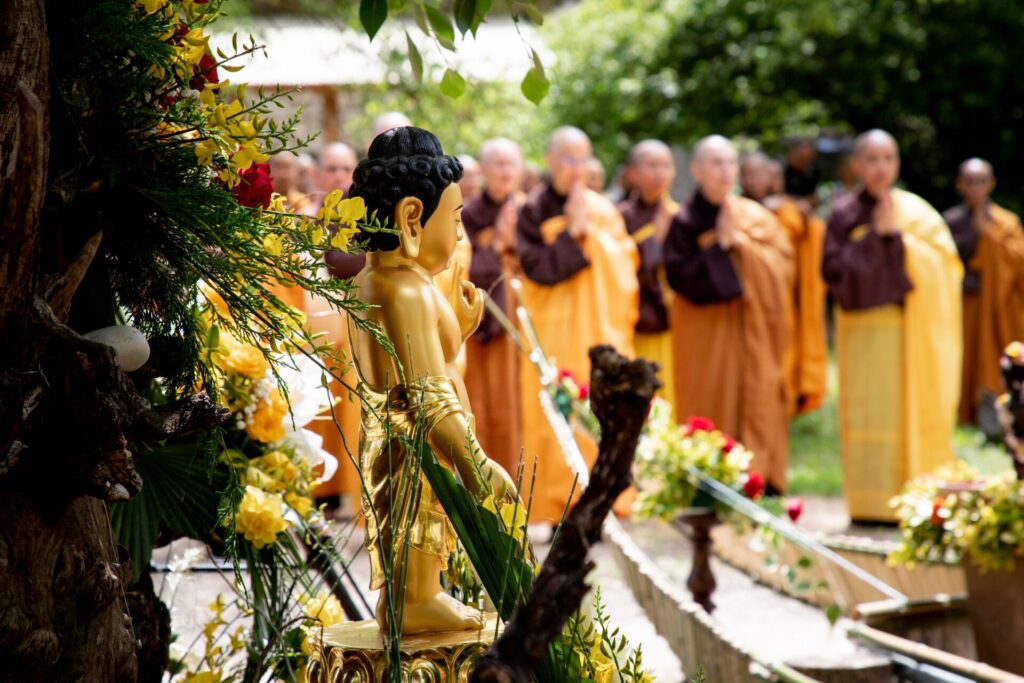
Leaving a Legacy: The Buddha Nature in Action
We need to see the habits we have inherited from our parents. Sometimes, we do things and ask, “Why do I do this?” I’ve never been taught this, but I do it. If you have a chance, go home and study your parents. Your parents can be your meditation. I looked deeply at my mom and dad and saw the wonderful talents they had, and I started to see them in me.
My mother is very neat and tidy. Everything is always done with perfection. I recognize that seed of perfection in me. When we do things not particularly the way we set out to do, I suffer. In my practice, I start to say, “Hello, my seed of perfection from my mother. I breathe with you. There is nothing perfect in this world. Let me transform this seed.”
Then, there are seeds I’ve inherited that are very difficult to practice with, but we recognize them. We see that this is an opportunity to transform that seed. For my parents, they grew up during the war. What preoccupied their life and their minds was food. Did we have enough? The fear of hunger was very strong. I grew up in a better condition, in Canada, and we always had enough food. But when I came to the Sangha, we say that eating meditation doesn’t begin when you eat. Eating meditation begins already when you line up. I always noticed that I would take more than I needed. And every time I couldn’t eat the food, I felt regret. I asked myself, “Why am I doing this? Why do I do this to myself?” I know that after the second bell, I can get up and get more food if there’s still food. But why does fear always conquer me during the serving of the food?
One day, just by sitting and waiting for the bell to be invited, I recognized, “Ah, I was offered this seed of fear, the fear of not having enough.” By my mother and my father, by their past experiences, I was shaped. But that moment of liberation came when I said, “Mom and Dad, I’m going to transform this seed for you,” because I have more opportunities and conditions to devote my daily life to this understanding than they did.
There are some things that I know my parents won’t transform in this lifetime, and I cannot force them to transform. I cannot expect them to transform in order for me to love them.
I accept them for who they are and I have the insight that I can transform for them, and that gives me courage and aspiration to continue the path for them.
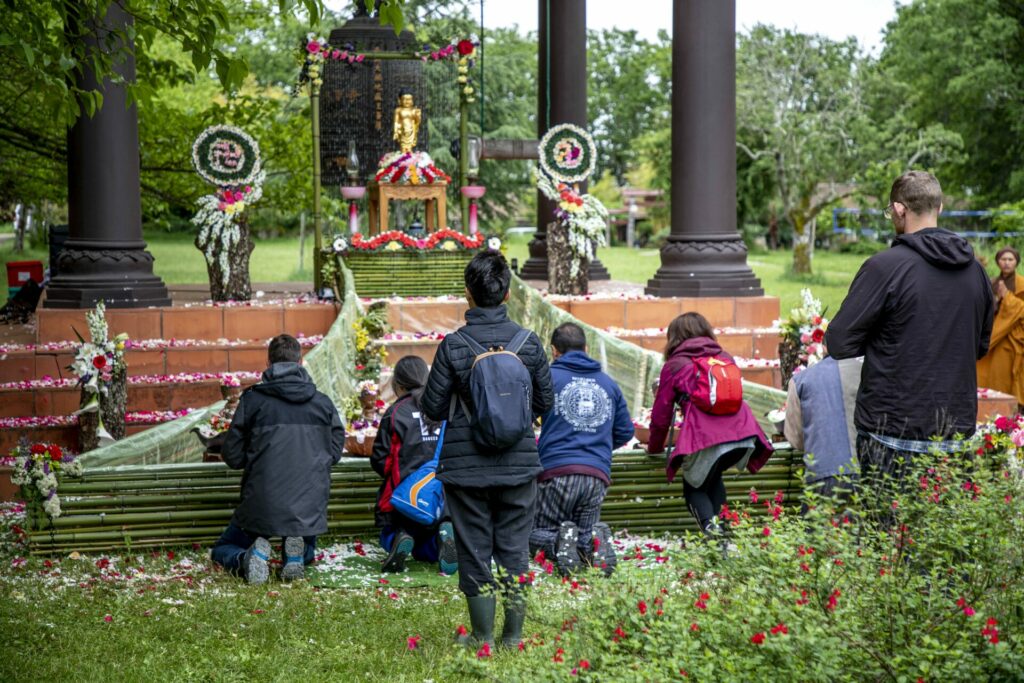
A Living Practice of Vesak
Today we will have a chance to have a ceremony together, to sit in stillness, to offer incense. When we offer incense, it’s not just the fragrance. We offer the fragrance of our mindfulness, of our oneness, the fragrance of mindfulness, concentration, and insight. Those are the fragrances that we can offer every day. You may not see it, and you may not smell it, but you can feel it when someone is solid, you can sense their presence.
We will then have a chance to walk together in a line of procession, and with each step we make, we dedicate some steps for the Buddha. I would dedicate 20 steps for Thay, even though he is not here, he is here with us. I will also dedicate some steps to our Buddha, and if we like, we can dedicate steps to our loved ones. Next, we will have a chance to water the baby Buddha.
The baby Buddha is the seed of awakening in every one of us.
We will have a chance to water the Buddha one time at a time. We do so with moderation, because there are many of us, with care and love.
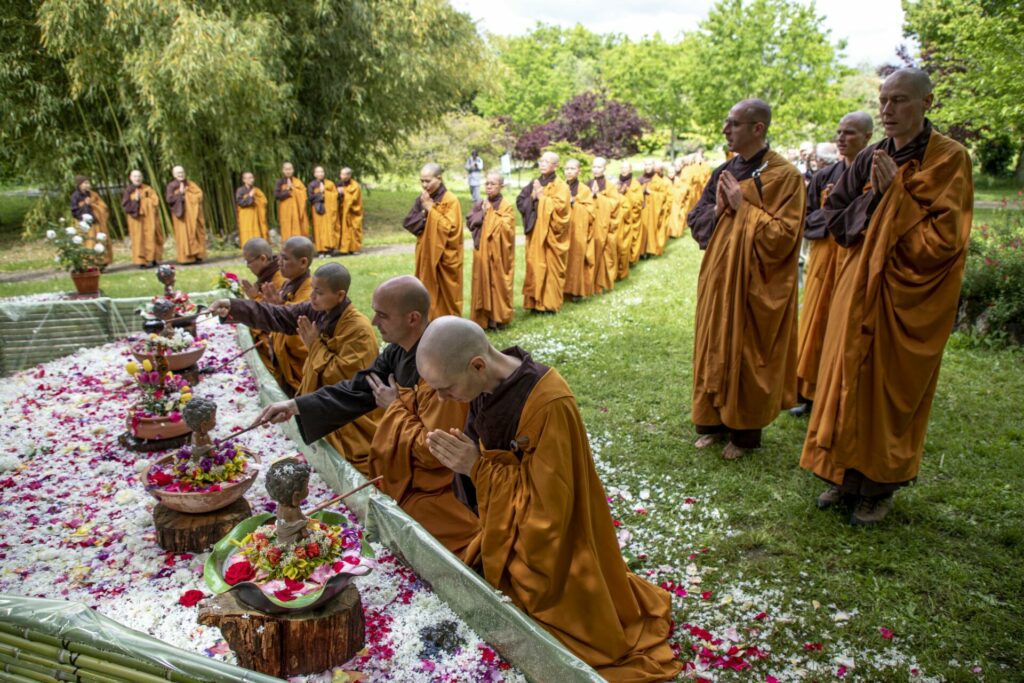
We do everything with two hands, because when we do something with two hands, it signifies full awareness. You take the Lego in one hand, and the other hand is gently placed on the hand holding the Lego. You truly have awareness of the action, of bathing the baby Buddha within us and in others.
Every time we bow today, we can say, “A lotus to you, a Buddha to be,” because all of us have Buddha nature. Today is a day of the Buddha. The Buddha is not up there, the Buddha is in here, in every one of us.
A lotus for you, a Buddha to be, to you all.
Resources
- Are You A Buddha? (Dharma Talk)
- Sitting With The Buddha (Guided Meditation)
- How to Deal with Strong Emotions (Short Teaching)



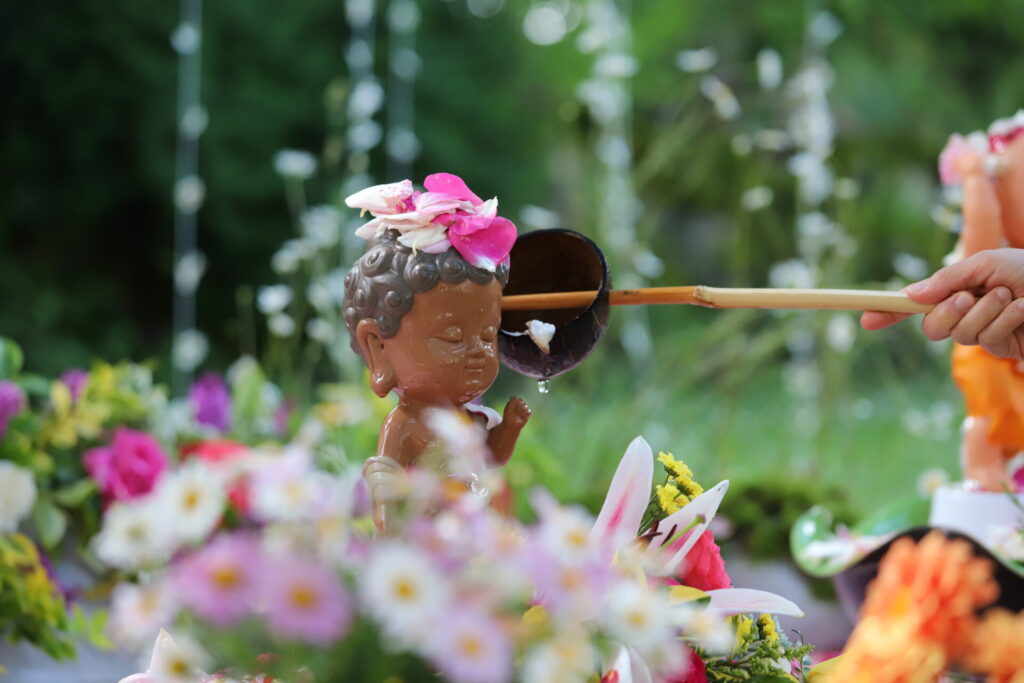
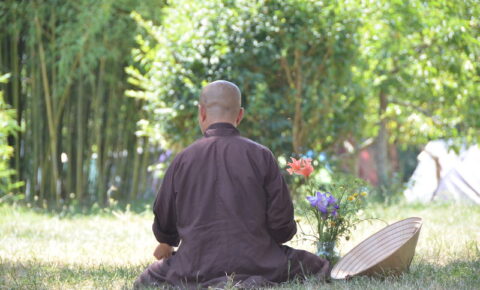
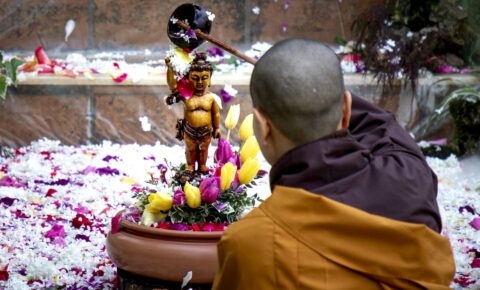
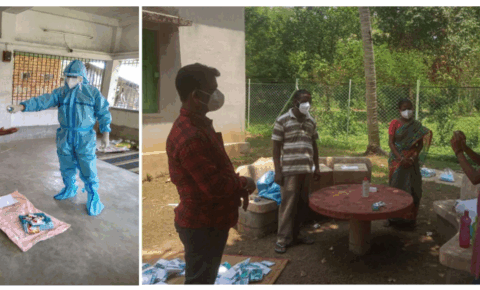
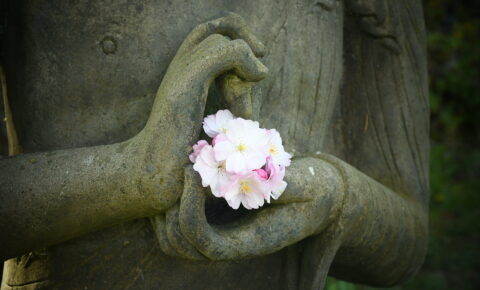
Share Your Reflections